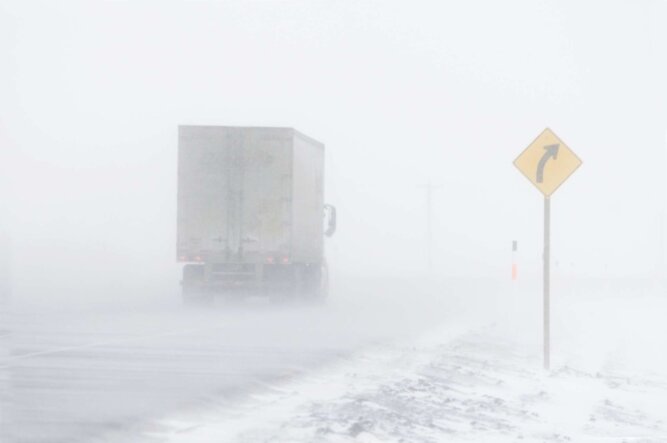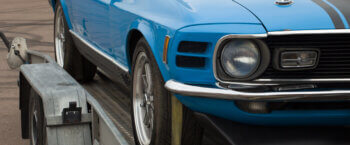Getting Your Truck Ready for Winter Conditions

Find your next load
Make more money starting now.
If you listen to anyone who’s been in trucking for a while, you’re likely to hear a story about driving in a blizzard, trying to get through a freezing rain storm, waking up to a truck frozen in its tracks at a truck stop and worse. For some truckers, that’s all happened in a single day!
Trucking is dangerous enough without adding hazardous weather conditions to the mix. If you’re driving a truck that’s not ready for negative temps and freezing roadways, you could end up a bad situation. Taking some precautions now could save you later.
Before you see a patch of ice or a single snowflake, get your truck ready now to keep you safe this winter.
Check your batteries.
Nothing drains and kills off a battery quicker than cold weather. Check the age of your batteries and see what kind of charge they have left. Keep a handheld battery tester in your truck so you can test them and know quickly if they need replacing. In general, it’s usually a good idea to replace batteries if they’re three years old and you know you’ll be driving in freezing temps.
Stock up on emergency supplies.
Breakdowns can happen at any time, but they can be extremely dangerous in the winter. Carrying some emergency supplies in your truck could save your life. Recommendations:
- Cold weather clothes including an extra coat, snow boots, hats, gloves, socks, etc. (An extra coat and gloves means you can swap them out if you get wet.)
- Flashlight and extra batteries
- First-aid kit
- AM/FM radio and extra batteries
- Hand and feet warmers
- Reflective vest and flares
- Tool kit with wrenches, sockets, screwdrivers, a hammer, pliers, duct tape, zip ties, and any other tool you might use
- A shovel or trenching spade and a bag of salt or sand to deal with snow, ice, or mud
- Bungee cords and heavy-duty tow straps
- Extra gallon of oil and fuel filters
- Anti-gel fuel additivesto add to tank before fueling up
- Canned and dried food and plenty of water
Check your tires and tire pressure.
Underinflated tires wear faster and hurt your gas mileage. Cold weather makes tire pressure even worse. Always check your tire pressure during your pre-trip inspection and adjust it as needed. If a tire gets to 20% below the pressure recommended by the manufacturer, remove it and have it inspected. If you don’t, it could lead to trouble or a blown-out tire later.

Carry tire chains and know how to put them on.
Tire chains can help give you traction in snow and are actually required by law in some areas. Always carry chains on your truck, follow the manufacturer’s instructions for how to put them on, and take them off as soon as they’re no longer needed (otherwise they damage roads AND tires.)
Look over your cab and sleeper.
Check it for any drafts or cold spots and seal any areas that need it. Keep extra blankets and a sleeping bag designed for below freezing temps in the sleeper berth so they’re there when you need them.
Check the air dryer.
The air dryer keeps water from entering and freezing in your brake lines. Make sure it’s working correctly and change out the filter so it’s ready for winter.
Get an engine block heater.
Diesel engines require a higher cylinder temp than regular gas vehicles which means they’re harder to start when it’s cold. If you know you’ll be spending a lot of time in colder climates or your truck will be sitting for a period of time, get an engine block heater so your truck always starts. If you already have one, plug it in and make sure it’s working like it should.
Look over your radiator.
Make sure the belts are in good condition. Check the hoses and clamps for leaks and fix them if you find any. Make sure the antifreeze is full and at the optimal freeze point for the conditions you’ll be driving in. Make sure the antifreeze brand is reputable to prevent any problems later. Keep extra antifreeze on your truck in case you need it.

Take a look at your wipers.
Replace windshield wipers that need it. Refill your windshield wiper fluid and keep it full. Carry extra windshield wipers, windshield wiper fluid, a windshield scraper and snowbrush, a window cleaner and paper towels on your truck so you’re prepared to replace and clean as needed.
The bottom line is that doing some prep work before driving in winter conditions could save you some downtime this season, not to mention it could save your life or someone else’s.
Get a CB radio.
Having a CB radio in your truck could save your life. Make sure you have one and know how to use it. If you’re worried about traveling in certain areas, start asking questions. Your fellow truck drivers will be able to tell you what you can expect of road conditions. They can also provide helpful tips like where to pull off the road and chain up, or they can share some ideas of where you can park for a few hours to wait out a storm.
Drive safe out there.
Truckstop can make finding loads and making money easier for the long haul. Contact us for a demo!

Find out how our platform gives you the visibility you need to get more done.
Get helpful content delivered to your inbox.
Schedule a demo.
Find out how our platform gives you the visibility you need to get more done.





